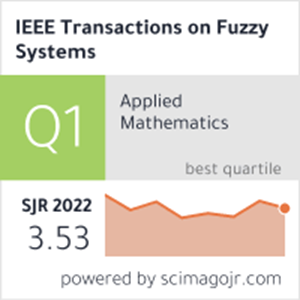Group Consensus Formation Under Fuzzy Preferences: Addressing Hypocritical Trust and Irrational Confidence
IF 11.9
1区 计算机科学
Q1 COMPUTER SCIENCE, ARTIFICIAL INTELLIGENCE
引用次数: 0
Abstract
With the rapid development of artificial intelligence (AI), group decision-making (GDM) has become a critical approach to ensuring the scientificity and fairness of decisions in complex systems. However, existing GDM methods often face limitations due to the presence of hypocritical trust and irrational confidence among decision-makers (DMs), which can significantly hinder the effective achievement of consensus. To address these challenges, this article proposes an innovative consensus reaching process that integrates fuzzy preference relations and advanced AI techniques to systematically identify and eliminate irrational factors in the decision-making process. The proposed method introduces a novel mechanism for quantifying the contribution degree of DMs based on game theory within the framework of fuzzy sociometric relations and effectively identifies and eliminates hypocritical trust relationships using geometric analysis. In addition, an innovative quartile classification method based on dynamic monitoring is designed to achieve real-time assessment and adjustment of the confidence level of DMs. By combining principles of calculus and geometry, an accurate calculation model of DM weights is constructed. The proposed method establishes a two-level consensus feedback mechanism integrating confidence level and trust degree, ultimately realizing the selection of the optimal alternative. Systematic case studies and comparative experimental analyses demonstrate the significant superiority of the proposed method in terms of consensus efficiency and decision-making quality. The key innovations of this research include the development of a new weight determination method based on calculus and geometry, the construction of a hypocritical trust identification mechanism using game theory and geometric analysis, and the establishment of an irrational confidence regulation system combining regret theory with dynamic monitoring. These contributions provide a robust theoretical framework and methodological support for addressing consensus challenges in complex GDM scenarios.模糊偏好下的群体共识形成:探讨伪善信任与非理性信心
随着人工智能(AI)的快速发展,群体决策(GDM)已成为复杂系统中保证决策科学性和公平性的重要手段。然而,由于决策者之间存在虚伪的信任和非理性的信心,现有的GDM方法往往面临局限性,这严重阻碍了共识的有效达成。为了应对这些挑战,本文提出了一种创新的共识达成过程,该过程将模糊偏好关系与先进的人工智能技术相结合,系统地识别和消除决策过程中的不合理因素。该方法引入了一种基于博弈论的模糊社会计量关系框架下决策主体贡献程度量化的新机制,并利用几何分析有效识别和消除了虚假信任关系。此外,设计了一种基于动态监测的创新四分位数分类方法,实现对dm置信水平的实时评估和调整。结合微积分和几何原理,建立了DM权值的精确计算模型。该方法建立了置信度和信任度相结合的两级共识反馈机制,最终实现了最优方案的选择。系统的案例研究和对比实验分析表明,该方法在共识效率和决策质量方面具有显著的优越性。本研究的主要创新点包括基于微积分和几何的权重确定新方法,基于博弈论和几何分析构建伪善信任识别机制,以及将后悔理论与动态监测相结合建立非理性信任监管体系。这些贡献为解决复杂GDM情景下的共识挑战提供了强有力的理论框架和方法支持。
本文章由计算机程序翻译,如有差异,请以英文原文为准。
求助全文
约1分钟内获得全文
求助全文
来源期刊

IEEE Transactions on Fuzzy Systems
工程技术-工程:电子与电气
CiteScore
20.50
自引率
13.40%
发文量
517
审稿时长
3.0 months
期刊介绍:
The IEEE Transactions on Fuzzy Systems is a scholarly journal that focuses on the theory, design, and application of fuzzy systems. It aims to publish high-quality technical papers that contribute significant technical knowledge and exploratory developments in the field of fuzzy systems. The journal particularly emphasizes engineering systems and scientific applications. In addition to research articles, the Transactions also includes a letters section featuring current information, comments, and rebuttals related to published papers.
 求助内容:
求助内容: 应助结果提醒方式:
应助结果提醒方式:


